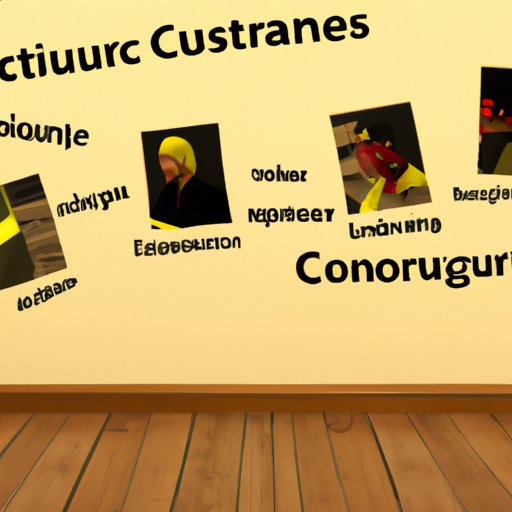Introduction
Cultural work is an umbrella term that encompasses a wide range of activities related to the arts, media, education, communication, and social services. It is a form of creative expression that seeks to promote understanding and appreciation for different cultures, strengthen communities, and foster innovation. This article will explore the definition of cultural work, provide a historical overview of past and present examples, discuss the various types of cultural work, analyze its role in society, examine the benefits and challenges of cultural work, and explore how to get involved in cultural work.

A Historical Perspective on Cultural Work
Throughout history, cultural work has been used to both document and influence societies, cultures, and identities. Examples of cultural work can be found in ancient art, literature, music, and architecture. In more recent times, cultural work has taken on new forms such as film, radio, television, and the internet. As technology advances, so does the scope of cultural work, which now includes digital storytelling, virtual reality, and interactive platforms.
Historical events have also had a significant impact on cultural work. For example, the civil rights movement of the mid-20th century sparked a wave of activism and creative expression that continues to shape our cultural landscape today. Similarly, the advent of the internet and other digital technologies has opened up new pathways for cultural production, dissemination, and consumption.
An Overview of Types of Cultural Work
Cultural work can take many forms, including but not limited to the following:
Arts and Entertainment
The performing and visual arts are essential components of culture. They provide a platform for creative expression and serve as powerful tools for communicating ideas and telling stories. Examples of cultural work in this area include theater, dance, music, painting, sculpture, and photography.
Education
Education is a key component of cultural work. It provides an opportunity to learn about different cultures and build bridges between them. Educational initiatives such as language classes, history courses, and cultural exchange programs are all examples of cultural work.
Media and Communication
Media and communication are integral to cultural work. They provide a platform for exchanging ideas and engaging with diverse perspectives. Examples of cultural work in this area include journalism, blogging, podcasting, and public speaking.
Social Services
Social services are essential to promoting understanding and acceptance of different cultures. Examples of cultural work in this area include volunteering, community organizing, and advocacy.
The Role of Cultural Work in Society
Cultural work plays an important role in society by enhancing understanding of different cultures, strengthening communities, and fostering creativity and innovation. Through its various forms, cultural work can help bridge cultural divides and create meaningful dialogue between people of different backgrounds. Cultural work can also increase access to education and social services, providing opportunities for people to learn and grow.
Exploring the Benefits of Cultural Work
Cultural work has numerous benefits for individuals, communities, and society as a whole. Here are some of the key benefits of cultural work:
Building Bridges Between Cultures
Cultural work can help build bridges between different cultures by fostering understanding and appreciation for other cultures. By engaging with cultural works from around the world, people can gain insights into the lives and experiences of others and develop empathy and respect for their differences.
Increasing Access to Education and Social Services
Cultural work can increase access to education and social services, particularly in underserved communities. By providing educational and social resources, cultural work can help empower individuals and communities to succeed.
Encouraging Creativity and Expression
Cultural work encourages creativity and expression by providing a platform for self-expression and sharing ideas. Through its various forms, cultural work can inspire people to explore their own creativity and discover new ways of expressing themselves.

Analyzing the Challenges Faced by Cultural Workers
Despite its many benefits, cultural work can also present challenges for those involved in it. These challenges include limited resources, unequal access to opportunities, and unrecognized labor.
Limited Resources
Cultural work often requires significant resources, including time, money, and materials. Unfortunately, these resources are often scarce, making it difficult for cultural workers to achieve their goals.
Unequal Access to Opportunities
Cultural work can be demanding and competitive, and opportunities are not always equally accessible. People from marginalized backgrounds may face additional barriers due to systemic inequalities, making it difficult for them to participate in cultural work.
Unrecognized Labor
Cultural work is often undervalued and underpaid, leading to frustration and burnout among cultural workers. This is especially true for those in low-paying or volunteer positions, who may be expected to do a lot of work for little or no compensation.

Examining the Impact of Cultural Work on Local Communities
Cultural work can have a profound impact on local communities. Here are some of the ways in which cultural work can affect communities:
Economic Impact
Cultural work can have a positive economic impact on communities. Creative projects can generate jobs and income, while cultural tourism can bring money into the local economy.
Social Impact
Cultural work can help strengthen communities by fostering connections between people from different backgrounds and creating a sense of shared identity. Cultural events and activities can also provide a platform for socializing and networking.
Cultural Impact
Cultural work can help preserve and promote local traditions, customs, and values. It can also help introduce new cultural elements to a community, allowing it to evolve and grow.

Exploring How to Get Involved in Cultural Work
If you’re interested in getting involved in cultural work, there are several ways to do so. Here are some suggestions:
Volunteering with Local Organizations
One way to get involved in cultural work is to volunteer with local organizations that are engaged in cultural projects. This is a great way to gain experience and make a difference in your community.
Applying for Grants and Fellowships
Organizations and foundations often offer grants and fellowships for cultural projects. Applying for these is a great way to fund your project and get recognition for your work.
Participating in Public Art Projects
Public art projects are a great way to engage with the community and express yourself creatively. Look for opportunities to take part in public art projects in your area.
Conclusion
In conclusion, cultural work is a form of creative expression that seeks to promote understanding and appreciation for different cultures, strengthen communities, and foster innovation. It encompasses a wide range of activities related to the arts, media, education, communication, and social services. Cultural work can benefit individuals, communities, and society as a whole, but it can also present challenges such as limited resources, unequal access to opportunities, and unrecognized labor. If you’re interested in getting involved in cultural work, there are several ways to do so, including volunteering with local organizations, applying for grants and fellowships, and participating in public art projects.
(Note: Is this article not meeting your expectations? Do you have knowledge or insights to share? Unlock new opportunities and expand your reach by joining our authors team. Click Registration to join us and share your expertise with our readers.)
